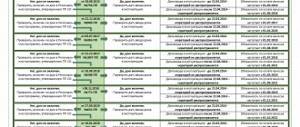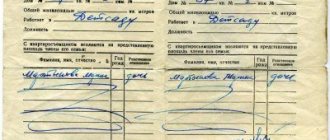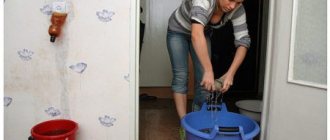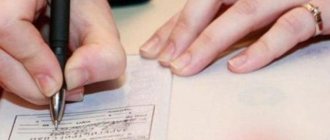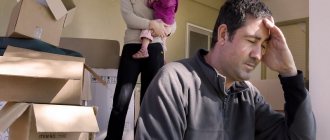Reasons for non-payment
Federal Law of December 25, 2012, number 271[1], in the first paragraph states that citizens who own real estate in apartment buildings are required to make contributions to the fund responsible for repairs.
Major repairs mean a set of measures that improve the condition of the building, conditions that ensure the standard of living, health and comfort of residents.
The first to oppose the collection were the owners of apartments in new buildings, due to a lack of understanding of where the funds collected over so many years would go until the building needed major intervention.
The second group consists of people who are accustomed to solving problems on their own and confident in their abilities. It seems useless to them to spend money on paying for work that they can do themselves, for example, organizing the replacement of pipes.
Some people simply do not trust the organization carrying out the collection. In their opinion, the management company will simply embezzle the funds without thinking about transferring them to the fund created for this purpose. Of course, the repair fee varies in regions and may not be the largest amount, but in the aggregate, management companies receive colossal amounts of money from each apartment. Many doubt that the money will be used adequately and taking into account the interests of homeowners.
There is a separate category of people who ignore payments in principle, do not want to explain this, and often have debts on other items.
The only people who do not need to pay the fee are the residents of apartments that are not privatized; under legal circumstances, they are not their formal owners. Or if the house is already in disrepair.
Conclusions on overhaul
The conclusions are disappointing - in this case it was not possible to go against the system, I quickly gave up, and will soon join the gray mass of those who pay for everything they say.
The trial is not scary, it is important to get in touch after the trial and find a common language.
320 rubles is the price of my peace of mind and feeling like a law-abiding citizen.
Major repairs are still being done in some places, and we must believe that there will be a holiday on our street.
What conclusions did you draw from my story? Write in the comments.
Responsible authorities
Collecting payment for major repairs is a task that neither residents’ meetings, nor homeowners’ associations, nor even the management company have the right to perform. These organizations do not have the right to announce any penalties for this.
What threatens non-payment for major repairs is legal proceedings initiated by the management company. The judicial authorities already have every reason to enforce debt collection. Most often, the court uses standard measures from established practice.
Amount of payments for major repairs - rules for determining
The cost of a major overhaul is based on several factors. Region of residence is not the last factor. 5-7 rubles per square meter is the average tariff for the country.
They take into account what type of apartment there is inside the house. For example, residents of apartment buildings with a height of five floors or more pay a different amount when compared with other objects.
5.79 rubles is the highest tariff that residents of houses with a large number of apartments made of wood have to face. Different designs are taken into account.
This is due to the susceptibility of wooden structures to wear and tear. To repair such buildings, more funds are always required. Wear and tear is not as fast in monolithic, brick houses.
The number of residents and fees are greater if the house itself is large. Work on the roof and in the basement is the most expensive. Some regions introduced a single indicator for all; it was decided to abandon the difference.
The state sets the tariff, but this is not the final figure, but only a minimum, below which no one has the right to fall. The decision to increase the fee, if necessary, is made after a meeting of owners. Then the collection of money goes faster, and the house will be able to carry out the necessary work faster.
Regional operators are responsible for calculating payments; they use the tariffs established at the current time.
Possible consequences
Many, having received a court summons, ask: do they have the right to sue for non-payment of capital repairs? Yes, the procedure is completely legal. If the owner is sued for failure to pay for capital repairs, he may face the following penalties:
- Accrual of penalties. An increase in interest on the amount of debt is the most popular measure to show the opponent of the payments that the matter is taking a serious turn and serious penalties await him in the future. Six months later, if this decision has no effect, a new trial begins, but the penalties are different.
- Fine. In addition to interest on late payments, a fine will be added to the amount of debt, which will definitely have to be paid, since it will be stored in the database and may lead to other problems.
- Seizure of property. To account for the unpaid funds, the bailiffs can seize the property of the person involved in the case and sell it at auction. An appraiser will arrive in the company of bailiffs, who will select an item of commensurate value in the debtor’s apartment. Sometimes, the property is not sold, but only seized to demonstrate to the debtor the force of the law. It will be returned either after payment of the debt, or later, for preventive purposes.
- Travel restrictions. A special database is maintained in which debtors are listed. If a citizen’s name is found in it when he tries to fly away on vacation, you can forget about the trip.
Consequences and liability for failure to pay contributions for major repairs
Non-payment is an action that is punishable according to current legislation. But who has the right to hold homeowners accountable?
Penalties cannot be applied by HOAs or other forms of housing maintenance organizations. Therefore, the courts are usually responsible for the procedure.
Many citizens are interested in what the consequences of having debt for major repairs are. If a citizen does not receive payment on time, he may face the following penalties:
- Travel ban.
- Seizure of property.
- Fines.
- Peni.
The last three points are targeted. The other two are general and can be applied to debtors of any category.
To bring a citizen to justice, representatives of the HOA file a statement of claim. The right arises for the company if the obligation is not fulfilled two or more times in a row.
They will not go to court if the debts arise are minor. It’s another matter when the delays are serious and become systematic.
conclusions
What to do if you are sued for major repairs? We must try to cover the debt; the state will always be on the side of the management company. There can be a debate about the benefits of the fee, but it remains mandatory at the federal level. Refusal to contribute will result in penalties from the state. The best solution would be to make regular payments, which is guaranteed to help avoid problems with the law.
Call to court
I intended to write an objection to the court order, and just in case I called the court. There they told me that there was no problem, but I would still have to pay, one way or another. I understood it myself - the law is not on my side.
There I also learned that the same court order is sent to the claimant, i.e. Overhaul Fund. And then they give it to the bailiffs, thereby starting the debt collection process. This is judicial practice.
And in order to break the amount into parts, you will need to negotiate with the bailiffs.
In short, it’s still a burden.
What rights do owners have to carry out major repairs?
When opening a special account, residents have the opportunity to control the receipt and expenditure of money. They can independently determine at a general meeting when and what repairs need to be performed, rather than waiting in line with the regional operator.
Advice! If residents feel that they have not had repairs for a long time and the condition of the house leaves much to be desired, they have the right at a general meeting to demand that the TSN management report on this matter and provide supporting documentation on the volumes and prices of the work performed.
The amount of payment for major repairs depends on the area of the apartment, since the rate is determined per 1 sq. m. This point outrages some residents, who believe that it would be more rational to charge payment from each owner, because the wear and tear of the house depends on how many people use the elevator or water supply.
In the Voronezh region, a judicial practice has been formed for collecting debts on contributions for major repairs
The Fund for the Overhaul of Apartment Buildings of the Voronezh Region has already prepared documents for the simplified collection of debt on contributions from 40 defaulters - residents of Voronezh, Bobrov, Borisoglebsk, Povorino and Rossoshi.
In Russia, a simplified procedure for collecting debts for payment for residential premises and utilities has begun to operate, which includes a contribution for major repairs. Now, if the amount of the debt does not exceed 500 thousand rubles, the creditor only needs to apply to the magistrate’s court at the debtor’s place of residence. The court, based on the documents presented and without summoning the parties, will make a decision on debt collection within five days.
How can you reduce your debt?
There is no need to pay for the entire six years. The law has the concept of limitation of actions - this is the period for defending the claim of a person whose rights have been violated. As a general rule, the statute of limitations is three years.
Art. 195, part 1 art. 196 Civil Code of the Russian Federation
The Ministry of Construction believes that the three-year period also applies to obligations to pay contributions for major repairs. The courts also adhere to this rule.
For example, in the Khanty-Mansiysk Autonomous Okrug, a woman did not pay for major repairs for several years because she was not sent receipts. The Capital Improvement Fund filed a lawsuit and demanded to collect the debt from September 1, 2014 to February 29, 2021, that is, almost five years. According to the fund, the woman herself should have applied for receipts if she did not receive them.
The debtor asked the court to reject the fund’s claims: since she did not receive a receipt, she could not pay. However, the court said that the obligation of the owner of the residential premises to pay contributions for major repairs arises by force of law. This means that if the fund did not send payment documents and demands for debt payment to the owner, including for a long time, this is not a reason not to pay for major repairs at all.
However, the fund was never able to recover the entire amount. The woman filed an application for the application of the statute of limitations, and the court granted it. He partially reduced the claims: he reduced the amount of debt by almost half, and the amount of penalties by three.
You can also apply the statute of limitations. But there is one caveat: this can only be done during a trial. That is, the capital repair fund must file an application with the court to collect the debt from your spouse. Until there is a trial, the statute of limitations cannot be applied.
All about how to live in Russia
And interact with the management company and neighbors - in our newsletter. Subscribe so you don't miss important articles
What happens if you don’t pay into the capital repair fund?
For improper fulfillment of obligations to make contributions for the maintenance of residential premises, the following types of liability are provided:
- Court order (Chapter 11 of the Code of Civil Procedure of the Russian Federation). The debtor is sent an order demanding reimbursement of the amount of debt at the corresponding request of the collector.
- Court decision (Chapter 16 of the Code of Civil Procedure of the Russian Federation). The debt is collected by a court decision at the stage of completion of the claim proceedings in the event of an appeal against the court order.
- Accrual of penalties for major repairs (clause 14.1 of Article 155 of the RF Housing Code). If there are no payments within the period established by law, the amount of debt increases by a certain percentage for each day of delay.
- Fine . An additional measure of liability within the framework of a court decision in conjunction with the recovery of the principal amount of debt in case of malicious evasion of obligations.
- Seizure of property (subclause 7, clause 1, article 64 of Federal Law No. 229). During enforcement proceedings with the participation of bailiffs, property valued at the total amount of the debt is confiscated from the debtor. Subsequently, the property is sold at open auction, and the proceeds are sent to the claimant to pay off losses.
- Seizure of property (subclause 7, clause 1, article 64 of Federal Law No. 229). Another penalty in enforcement proceedings involving bailiffs. The property is seized for the benefit of the capital repair fund until the debt is paid.
- Seizure of accounts (subclause 7, clause 1, article 64 of Federal Law No. 229). A measure of collection in enforcement proceedings with the involvement of bailiffs, expressed in the freezing of the debtor's active bank accounts or withholding funds in favor of repaying the debt.
- Restriction on travel (subclause 3, clause 1, article 64 of Federal Law No. 229). Bailiffs have the right to issue a ruling on a temporary restriction on crossing the border of the Russian Federation if the amount of debt exceeds 30 thousand rubles.
Enforcement proceedings with the participation of bailiffs are initiated at the request of the management company or upon the fact of a court decision at the request of the claimant (clause 1, clause 5
Art. 30 Federal Law No. 229
).
As an enforcement measure, the debtor does not have the right to evict from the residential premises . The presence of debt for major repairs acts as an unofficial encumbrance in the case of the sale of an apartment, since the transaction is accompanied by the provision of a certificate from the BTI. This circumstance will adversely affect the cost of housing and buyer confidence.
You will find all the details of whether it is possible not to pay contributions for major repairs in an apartment building in another material.
Legal consultation. Result guarantee. Call.
Methods for checking debt
Often, tenants or even new apartment owners discover that there is a debt for major repairs at their address. Often, along with this debt, there are other types of debt - for housing and communal services, garbage removal, etc.
New owners or tenants, of course, do not expect to see a large amount owed. However, often the previous owners leave behind an extremely unpleasant “tail” in the form of an extra several tens of thousands of rubles of debt.
And it would be nice if the previous residents at least left receipts. But in most cases they are simply not found anywhere - neither in the house itself, nor in the mailbox.
There are several ways to find out your debt online:
- You can view your account status through the State Services service;
- On the website of your Unified Settlement Center, which is responsible for servicing your home;
- Through a personal appeal to the Capital Repair Fund or the Homeowners Association.
In all of the above cases, searching for your home is possible by address, personal account or by an already generated receipt. Let's take a closer look at how to find out the status of your account depending on the method.
Through State Services
The convenience of this method is that the entire procedure is done online - you will not need to go anywhere, collect documents, etc. It is enough to have a registered account in the State Services system, access to the Internet and the address of your home. So, how can you find out the debt for major repairs at an address? Follow our instructions:
- Go to the State Services website at https://www.gosuslugi.ru
- If you do not have your own account, you will need to register on the resource. To do this, click on the “Personal Account” button in the upper right corner, then click on the “Registration” button. You will need to enter your passport and contact information. Next, an SMS message with a verification code will be sent to your specified mobile number. Confirm ownership of the number, after which registration will be completed;
- Next, click on the “Service Catalog” button at the top of the site. Find the section “Payment for housing and communal services” ( https://www.gosuslugi.ru/10373/1 ). Click “Get a service”, enter your address, after which the system will automatically display the status of your account: existing debts, accrual dates, division of payments into categories, etc. In addition, right here you can pay off your debt by paying with a bank card, e-wallet or other way.
Thus, you only need a personal account on the State Services website. In this case, your personal account number will not even be needed - you only need the address of the apartment or house.
On the website of your URC or HOA
The method is very similar to checking your balance through State Services - everything is done via the Internet in a couple of clicks. In addition, checking the balance through the website of the service organization well answers the question “how to find out the debt for major repairs on a personal account”, because in this case, to check the debt you will not need anything other than a personal account.
The algorithm of actions is as follows. First, you need to find out which company is doing the major renovation of your home. To obtain this information, you can contact the Capital Repair Fund.
Next, go to the website of your URC or HOA. You will first need to go through the registration procedure - as a rule, they only require an email, a password for a new account and a personal account number. You will receive an email with a link inside - you need to follow it to confirm. After confirming your email, you can already track the status of your balance.
The design and functionality of the site directly depends on the URC or HOA, so it is impossible to give universal instructions. Try to find the section “Balance”, “Amount to be paid”, “Pay for major repairs”, etc. As a rule, this is where information is located for the user about the amount of debt and the date of its occurrence.
In person at the FKR or HOA
Unlike all previous methods, personal application requires time and a small package of documents, without which the center employees will refuse to provide information. You need to take with you:
- Certificate of registration of ownership or other document confirming your right to housing;
- Internal passport of the Russian Federation. It is especially good if it has a stamp indicating permanent registration at the address about which you want to receive information.
The addresses of the FKR or HOA can be found using online maps like Google Maps or Yandex Maps. Only the person who is registered in the housing space on a temporary or permanent basis, as well as the owners of this housing (even if there are many owners, and each has only a small share of the housing) can apply to the FKR or HOA.
FKR or HOA employees are required to provide you with all the necessary information on the day of your application. In practice, the client is informed about the status of his personal account immediately after checking the documents, i.e. The entire operation takes no more than 20 minutes.
Attention: the seller is obliged to give the buyer, upon purchase and sale, an original certificate of absence of debt on utility bills, because otherwise, if there are still debts for major repairs and housing and communal services, the new owner of the property will have to resolve the issue independently. Perhaps even through litigation, which is confirmed by extensive judicial practice in resolving housing disputes. Therefore, when buying an apartment, be sure to ask the seller for the appropriate certificate.
